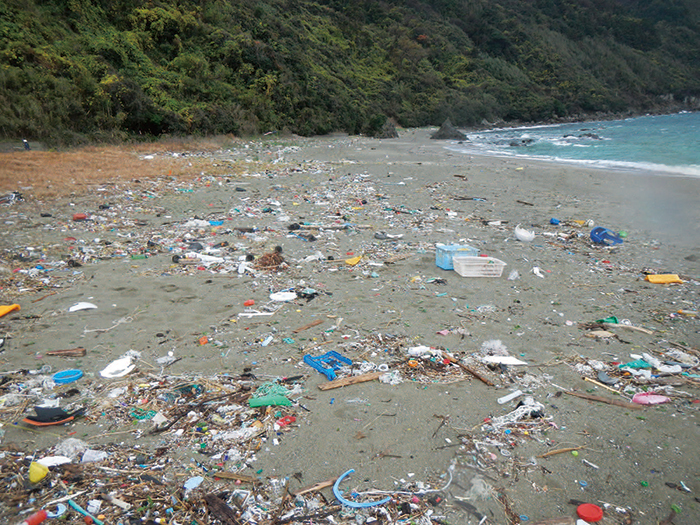Feature
The Issue of Marine Plastic Litter
Bringing additional pollution to zero on a global scale
The issue of marine litter, and marine plastic litter in particular, is drawing considerable attention both in Japan and around the world. This article explains the current state of the marine plastic litter issue and Japan’s measures to address it.

Marine plastic litter washed ashore
What’s happening with marine plastic litter?
Marine litter, including marine plastic litter (plastic waste discharged into the oceans), causes a range of problems such as deterioration of the marine environment, decline in coastal functions, harmful effects on seascapes, obstacles to ship navigation, and impacts on fisheries and sight-seeing. Further, concerns have risen in recent years over the impacts of microplastics (generally, tiny plastic pieces less than 5 mm in length) on marine ecosystems. According to a report released by the World Economic Forum in January 2016 “The New Plastics Economy: Rethinking the future of plastics”, at least eight million tons of plastic is discharged into the oceans annually, and the amount of plastic in the oceans (by weight) is predicted to exceed the amount of fish by 2050. Hence, the issue of marine plastic litter is a challenge faced on a global scale.
International trends involving the marine plastic litter issue
Within the context described above, the “Osaka Blue Ocean Vision”, which aims to reduce additional pollution by marine plastic litter to zero by 2050, was shared among leaders at the G20 Summit held in Osaka in June 2019. Likewise, the “G20 Implementation Framework for Actions on Marine Plastic Litter”, a framework for ongoing reporting and sharing on each country’s initiatives to realise the vision, was approved.
The first follow-up meeting based on the implementation framework was held in Tokyo in October 2019 ( see page 8 and 9). The meeting garnered the participation of about 100 persons including practitioners from 17 countries including G20 nations, international organisations and research institutions, who confirmed the promotion of policies and measures via mutual learning. As outcomes of the meeting, a report on the measures and best practices of various countries and a roadmap for resource efficiency were formulated, and a Chair’s Summary was compiled on the meeting and future initiatives. Additionally, Saudi Arabia, which assumed the G20 Presidency from December 2019, declared that the G20 will continue to address this issue this year.
Measures in Japan
Parallel to cooperation in the international arena, Japan is also advancing measures here at home.
A “National Action Plan for Marine Plastic Litter” was decided upon at a meeting of relevant cabinet members on 31 May last year. This plan compiles Japan’s proactive and concrete measures to address marine plastic litter aimed at realising a world without additional pollution. Moreover, the “Resource Circulation Strategy for Plastics”, which sets milestones related to plastic resource circulation, was jointly decided upon by relevant ministries and agencies on 31 May. In addition, upon revision of the “Act on Promoting the Treatment of Articles that Drift Ashore” last year, changes in the Basic Policy based on the law were also determined at the 31 May cabinet meeting.
Specifically in terms of innovation, Japan supports the development and diffusion of alternative materials, for instance, marine biodegradable plastics and functional paper packaging. We also host forums aimed at creating new initiatives by integrating the wisdom of diverse stakeholders, including private companies, NGOs, local governments and research institutes.
A national campaign entitled, “Zero Marine Litter Week” began in May 2019, with about 430,000 people participating in clean-up activities. These clean-up activities based on public involvement were the largest among the G20 nations. We will continue to endeavor to carry out strategic public relations activities to further raise awareness.
In closing
Based on the above, Japan will promote measures to: recover and appropriately dispose of plastics based on a holistic lifecycle approach; promote the 3Rs; advance innovation; carry out public campaigns and accumulate scientific knowledge. Further, we will share the “Osaka Blue Ocean Vision” with members of the international community outside of the G20 and call for participation in the “G20 Implementation Framework for Actions on Marine Plastic Litter”. As the nation that proposed the “Osaka Blue Ocean Vision” and a developed nation and frontrunner in addressing global challenges that has proactively engaged in promoting the 3Rs for plastics and sound treatment of waste, Japan will continue to lead initiatives toward implementing solutions to the problem of marine plastic litter.


